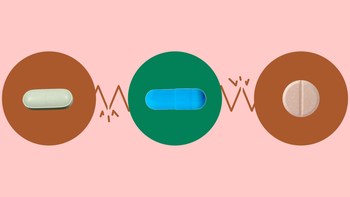
From Dry Mouth to Heart Problems: 9 Vyvanse Side Effects to Know About
Key takeaways:
Vyvanse (lisdexamfetamine) is a stimulant medication used to treat attention deficit hyperactivity disorder (ADHD) and binge eating disorder. Common Vyvanse side effects include loss of appetite, dry mouth, and insomnia. These often improve over time as you adjust to the medication.
Other possible Vyvanse side effects include anxiety, diarrhea, and dizziness. Nausea and vomiting are also possible.
Serious Vyvanse side effects include heart problems, serotonin syndrome, and severe mood changes. It may also slow growth in children, although the true impact remains unclear.
Table of contents
Vyvanse (lisdexamfetamine) is a long-acting stimulant medication. It’s FDA approved to treat attention deficit-hyperactivity disorder (ADHD) in adults and children ages 6 years and older. It’s also approved to treat binge eating disorder (BED) in adults.
If you or your child are prescribed Vyvanse, knowing what side effects are possible can help you stay safe and know when to seek medical care.
Vyvanse side effects at a glance
Below are common and serious Vyvanse side effects reported in clinical studies. Keep in mind that other side effects are possible. So it’s best to talk to your prescriber if you experience anything unusual while taking Vyvanse, even if it isn’t listed here.
Search and compare options
Common Vyvanse side effects include:
Loss of appetite
Weight loss
Anxiety
Diarrhea
Constipation
Dizziness
Dry Mouth
Irritability
Insomnia
Nausea and vomiting
Stomach pain
Serious Vyvanse side effects include:
Decreased growth in children
Increased risk of tics (uncontrolled, repetitive movements or speech)
Mood changes
Hallucinations or delusions (seeing or hearing things that aren’t there)
Allergic reactions
Vyvanse also has a boxed warning — the FDA’s strictest warning for medications — for its ability to cause misuse and dependence This is why Vyvanse is classified as a controlled substance. Taking Vyvanse differently than how it’s prescribed can lead to serious side effects, including overdose and death.
Below, we’ll look at nine Vyvanse side effects in more detail.
ADHD treatment options: Learn the difference between stimulant and non-stimulant medications, and how to choose between them when treating ADHD.
Vyvanse interactions: From antidepressants to blood pressure medications, learn which medications can interact with Vyvanse, and what happens if they’re combined.
Generic Vyvanse FAQs: What you need to know about generic Vyvanse options and tips for accessing it.
1. Loss of appetite
One of the most common Vyvanse side effects is loss of appetite. It may be helpful when treating BED. But when treating ADHD, a loss of appetite can lead to poor nutrition and weight loss — especially in children.
Your appetite may return as your body gets used to Vyvanse. In the meantime, foods such as smoothies and soups can make it easier to get the nutrients you need. Eating a small meal or snack every few hours can also help. But if you start feeling dizzy or faint, it’s best to seek medical care.
Talk to your prescriber if you’re concerned about your appetite or weight changes while taking Vyvanse. They can give you tips for managing this side effect. Or a different medication may be a better fit for you.
Good to know: Vyvanse is not a weight-loss medication. Using stimulant medications like Vyvanse off-label for weight loss can lead to serious heart problems. Talk to your prescriber about FDA-approved weight-loss medications to help with managing your weight safely.
2. Dry mouth
Dry mouth is another common Vyvanse side effect. It was reported more often by adults than kids, but anyone can experience it. You may also notice a bitter taste in your mouth, which is a result of having less saliva than usual.
Staying hydrated and sucking on sugar-free hard candies can help you manage dry mouth. A saliva substitute such as Biotene can also help. Be sure to get regular dental care, since dry mouth can lead to tooth decay.
3. Insomnia
Vyvanse’s stimulant effects can lead to insomnia (trouble sleeping) for some people. The effects of Vyvanse can last for up to 14 hours after taking it. Because of this, it’s best to take Vyvanse at the start of your day to avoid sleep issues.
Practicing good sleep hygiene can also help combat insomnia. This includes avoiding screens before bedtime and keeping a consistent bedtime schedule. If you’re unable to get a good night's rest while taking Vyvanse, let your prescriber know. A shorter-acting medication may be a better fit for you.
4. Mood changes
Vyvanse and other stimulants can sometimes make you feel jittery, irritable, or anxious. Like loss of appetite, these side effects may lessen with time as your body adjusts to the medication. But if they’re bothersome or you don’t feel like yourself, let your prescriber know.
It’s common to have anxiety or other mood disorders along with ADHD or BED. So you may need additional treatment to manage it. Or a non-stimulant medication may be a better fit for you.
In rare cases, Vyvanse may cause more serious mood changes or mental-health problems. If you or your child starts behaving differently than usual or begins to see or hear things that aren’t there, seek medical care right away.
5. Diarrhea
Diarrhea is another possible Vyvanse side effect. But it’s more common in those taking it for ADHD. Constipation was reported more often by those taking Vyvanse for BED.
Diarrhea will usually resolve on its own. Drink clear liquids with electrolytes to keep hydrated. It’s also a good idea to avoid spicy foods and caffeine. If needed, you can also try an over-the-counter treatment, such as loperamide (Imodium A-D).
If your diarrhea is severe, lasts more than 2 days, or you also have a fever, seek medical care.
6. Dizziness
Feeling dizzy is another possible Vyvanse side effect. In most cases, it’s mild and will go away on its own. But it’s best to avoid driving until you know how Vyvanse affects you. Staying hydrated and making sure you’re eating enough can also help prevent dizziness.
Feeling dizzy can also be a symptom of more severe Vyvanse side effects, such as heart problems or serotonin syndrome (more on those next). So if it doesn’t go away, worsens, or you have other symptoms along with it, it’s best to seek medical care.
7. Nausea and vomiting
Some people taking Vyvanse may experience nausea and vomiting, especially when first starting the medication. Stomach pain is also possible, especially in children.
You can take Vyvanse with or without food. But taking it with food may help prevent nausea. Eating smaller, more frequent meals and avoiding fried or spicy foods may also help.
If nausea persists, or you’re vomiting after taking Vyvanse, let your prescriber know. They can help manage your symptoms or suggest a different medication that’s less likely to upset your stomach.
8. Heart problems
Vyvanse can increase your blood pressure and heart rate. It can also cause more serious heart problems, such as an irregular heartbeat, in rare cases.
If you’re living with high blood pressure that’s controlled by medication, your prescriber may decide it’s safe to try Vyvanse. They’ll likely keep a close eye on your heart and have you test your blood pressure at home more often than usual.
In most other cases, it’s best to avoid Vyvanse if you have a history of heart problems. If you develop chest pain, have trouble breathing, or feel your heart beating differently than usual while taking Vyvanse, seek medical care right away.
9. Serotonin syndrome
While rare, Vyvanse can lead to serotonin syndrome. This is a condition that happens when there’s too much serotonin in your body. And in severe cases it can be life-threatening.
Serotonin syndrome with usual Vyvanse doses is rare. But it’s more likely if you take Vyvanse with other medications that raise serotonin levels, or if you take too much of it. Make sure your healthcare team has your complete medication list so they can check for this interaction.
Symptoms of serotonin syndrome include sweating, shivering, and a fever. Confusion, seizures and hallucinations are also possible. Seek medical attention immediately if you think you’re experiencing serotonin syndrome.
Does Vyvanse prevent children from growing normally?
Several studies have linked Vyvanse to reduced height and weight in children. But many were only conducted for short periods of time. A 2017 study that followed children for 2 to 16 years after taking stimulants for ADHD. It found that stimulants may negatively affect your child’s adult height by a few centimeters. But a 2023 review found that any changes in height or weight were insignificant.
Keep in mind that untreated ADHD can also have negative consequences on your child's academic performance and social development. And your prescriber will closely monitor your child's growth and development if they’re taking a stimulant medication.
In the end, it’s best to talk to your prescriber about the risks and benefits of Vyvanse. They can help you make an informed decision based on your child’s individual needs.
The bottom line
Vyvanse (lisdexamfetamine) is a stimulant medication that treats attention deficit hyperactivity disorder (ADHD) and binge eating disorder (BED). Common Vyvanse side effects include loss of appetite, dry mouth, and insomnia. Anxiety, diarrhea, and dizziness are also possible.
Serious Vyvanse side effects include heart problems, serotonin syndrome, and severe mood changes. It may also have a negative effect on your child’s growth and development. Your prescriber can help you weigh the risks and benefits of Vyvanse based on your medical history.
Why trust our experts?



References
Bray, B., et al. (2022). Mental health aspects of binge eating disorder: A cross-sectional mixed-methods study of binge eating disorder experts' perspectives. Frontiers in Psychiatry.
Coghill, D. R., et al. (2014). A systematic review of the safety of lisdexamfetamine dimesylate. CNS Drugs.
Ermer, J.C., et al. Lisdexamfetamine dimesylate: Prodrug delivery, amphetamine exposure and duration of efficacy. Clinical Drug Investigation.
Farzam, K., et al. (2023). Stimulants. StatPearls.
French, B., et al. (2023). Risks associated with undiagnosed adhd and/or autism: A mixed-method systematic review. Journal of Attention Disorders.
Hutt Vater, C., et al. (2023). Growth trajectories in stimulant treated children and adolescents: A qualitative review of the literature from comprehensive datasets and registries. Journal of Child and Adolescent Psychopharmacology.
Schneider, E., et al. (2022). The effects of lisdexamfetamine dimesylate on eating behaviour and homeostatic, reward and cognitive processes in women with binge-eating symptoms: An experimental medicine study. Translational Psychiatry.
Takeda Pharmaceuticals America, Inc. (2023). Vyvanse [package insert].
Topriceanu, C. C., et al. (2022). The use of attention-deficit hyperactivity disorder medications in cardiac disease. Frontiers in Neuroscience.
Was this page helpful?
Related Articles
Browse medications
View AllResearch prescriptions and over-the-counter medications from A to Z, compare drug prices, and start saving.
















